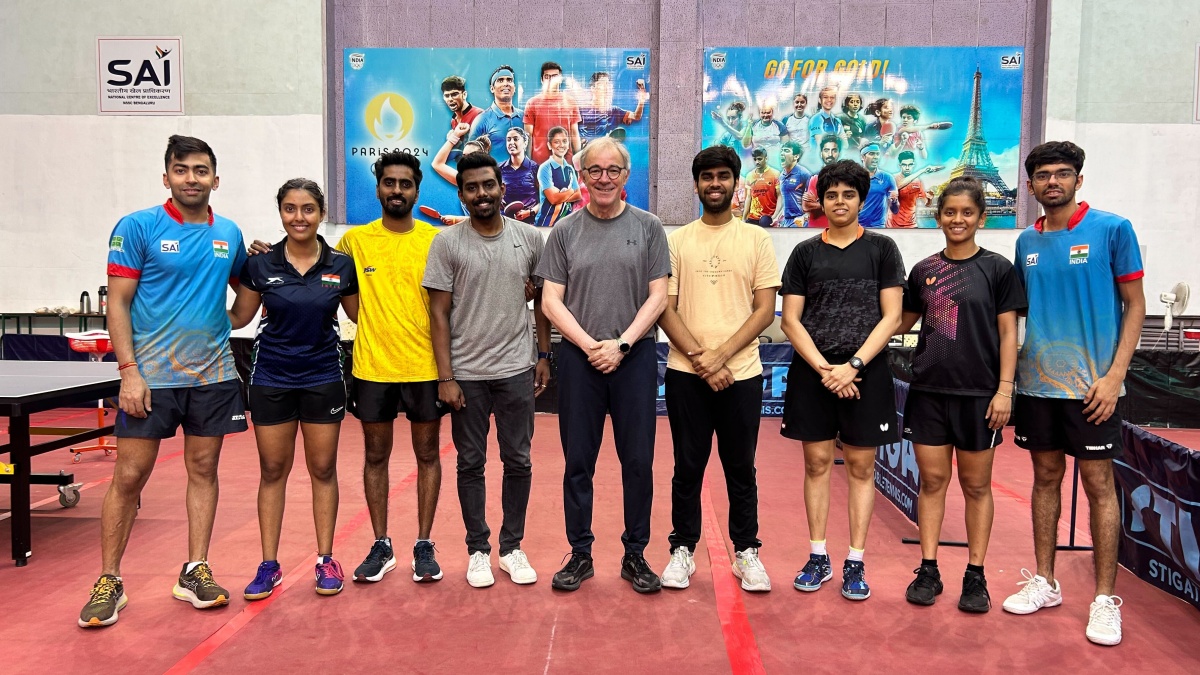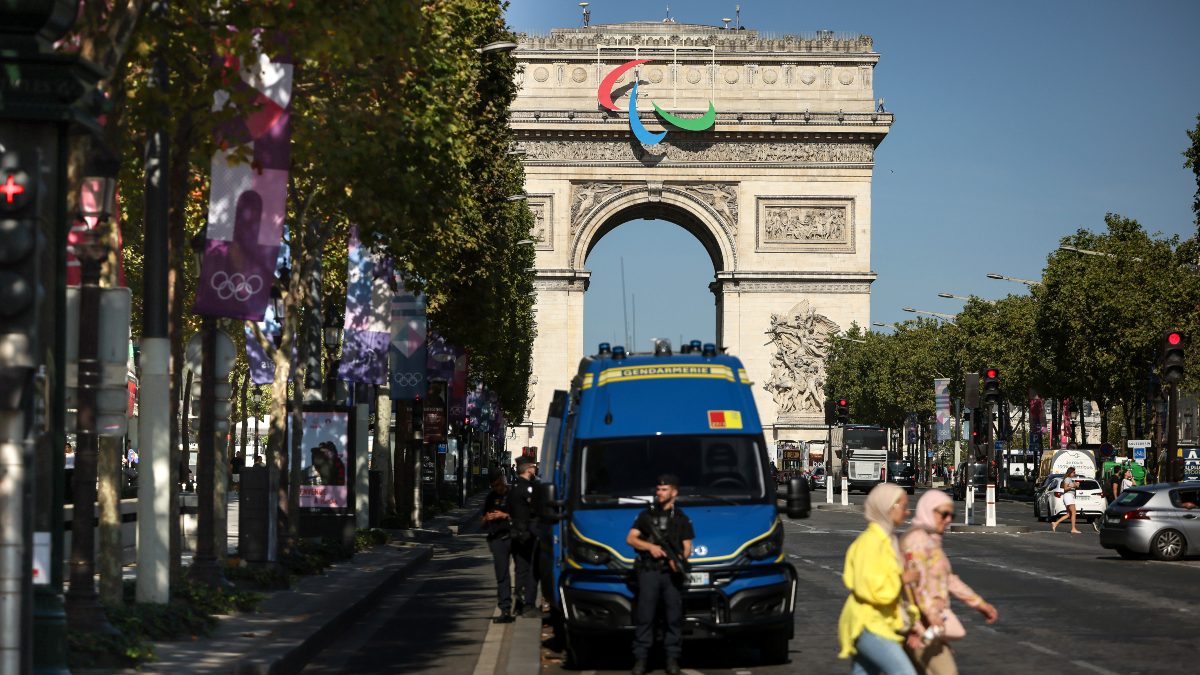In preparation for the Paris Olympics, India’s table tennis contingent have spent countless hours in training and competition. Aiding their medal goal is video technology and AI. read more
)
Indian table tennis team with coach Massimo Costantini in a training camp before the Olympics. Image: Special arrangement
India’s table tennis team of six, eight if you include the reserves, has been slogging it off for months ahead of the Paris Olympics. With Achanta Sharath Kamal, set for his fifth Olympics, and Manika Batra, for her third, in their midst, the young contingent have the right level of experience to spearhead their medal chances.
Paris Olympics 2024: News, schedule, medals tally and more
On the sidelines is coach Massimo Costantini, due to be part of his fourth Olympics — one as a player and three as a coach. He’s worked alongside the Italian team, the USA team and has been part of the Indian setup for over a decade now.
Despite the experienced stalwarts to steer the squad, there is acceptance of modern technology to aid their chances. With sports analytics playing a pivotal role, table tennis is not behind. 66-year-old Costantini has video analysis going back to 2009 from his first assignment in the country.
“Technology can help us where the human eye maybe is not able to detect certain things or maybe we have an idea, technology can give to the coaches some additional support and to give to the players additional awareness about their performance, whether it is in the training or in the competition or any other attitude they display during the performance. So it can be also helpful for tactics, not only for our players but also in viewing other opponents,” said Costantini in a conversation with Firstpost.
Massimo believes in using video technology during the training sessions and matches for positive reinforcement.
Road to Paris | Do India have a medal chance in table tennis?
“Performance is always related with numbers and mood. Sometimes players don’t have good psychological perception of themselves, when they lose the point they feel it’s their fault, you can prove that your opponent did better than you.
“Our sport is based on two individuals, so having video assistance for additional support can corroborate what the coach tries to explain,” he adds.
With thousands of data points to choose from — forehand, backhand, level of spin, when to take breaks, where to serve, understanding movement patterns, identifying which ones to focus on is crucial.
Artificial Intelligence (AI) plays a huge role in highlighting the big learnings. Based on the video clips and trove of data collected, AI can highlight a player’s winning tactics which can aid coaches and players in developing counter strategies.
Still, there is human intervention in identifying which analysis are ideal and how to implement them.
“Each player may have some some areas to improve whether is the timing, whether is the point of contact, how to exploit their speed, by showing them the video and then the mistake. Some data (may) also refer to the consistency, even in the simple drills or in the match. People believe what you do, not what you say, so once we show them objectively then it has a stronger impact on their understanding. Not to mention the footwork, the balance, the recovery movement, so there is a lot of data to process,” said Costantini.
“We can have some weakness but also some good things because we are always thinking about weakness, we don’t focus on the strength, we think we have always to bridge the gap. The data and technology can (also) help us emphasise what we do well. If they do well (with) something that gives them four, five, six points per game but why not seven, eight points, so I’m focusing also on their strength.”
Aiding this venture and effort in bringing technology and data analytics to Indian sport is Stupa Sports Analytics. Helming their efforts - rather fittingly - are CEO Megha Gambhir, a former techie, and COO Deepak Malik, who is a former India table tennis player and coach.
Take this for Stupa’s analysis from 2019. Manav Thakkar, one of the members of the Indian team in Paris, lost in straight sets to Sathiyan G, reserve for the 2024 Olympics. It was identified that Thakkar’s receiving strokes were passive which allowed Sathiyan to dominate.
Next year, having taken these analysis into account and worked with his coach on Banana flips, Thakkar won 4-2.
The objective, Malik says, is to aid the coaches in what they wish to achieve with the players at their disposal.
“It totally depends on coaches. For the camp, the data which needs to be driven out with the help of technology was given by Mr. Massimo. He had some ideas before coming to the camp, what he wanted to show to the player and what kind of awareness player needs to have during the training or before the tournaments and before Olympics. He gave us some ideas of what specific data points he wanted like rally analysis, their footwork, their point of contact or timing and then we worked on those specific metrics which eventually can help Mr. Massimo to make players more aware about themselves.
“Usually (this process) happens very slow or even (after) losing many matches. Players feel we are doing everything, we are doing correct but somehow we are not getting the exact result. So these kind of metrics or data points come into the picture to have a huge impact in them winning the final 11th point,” said Malik who has worked alongside Costantini as an assistant coach.
With such a large volume of data to comb through and AI getting jaw-droppingly good with each passing day, it leads to an existential question: can coaches be replaced by a computer? Both Costantini and Malik were in agreement: no. At least not yet.
“I don’t think technology can replace (coaches) because the feeling that you have during the game, that chemistry you can create with the player while advising or pre-match, during the match or post-match is something that data cannot replace. Or maybe in five-ten years I can be be contradicted for this but at the moment, the feeling you have in that moment, it’s your feeling, sometimes you go with the data, sometimes you go against it, sometimes players want to challenge something that data advises.
“You always have to try to focus on the player’s abilities and needs. Otherwise the technology can replace the job in a very cold way but this is a very live matter. The feeling in that moment I don’t think will be replaced by any machine,” said Costantini.
“I remember in 2018, but in many other situations, sometimes we won the point by eye contact. From the players to the bench, to the coach. The coach is always focused on the player and one eye contact could give confidence to the player. I don’t think players can turn their head towards the bench and watch the camera to get the same encouragement.”
Malik agrees that the technology is there to advise, guide and supplement the coaches rather than replace them.
“I feel technology is there to help the human being, not to replace the human being. And it’s not about sports, it’s about other areas also where definitely the world is now talking about AI and AI is overtaking the human brain. But it totally depends on how to use the technology, how to lead the technology.
“Similarly, when internet was discovered and the storm of internet came, similar kind of talks were happening. With AI and technology, things are changing fast. Things are now achievable in a faster and more efficient way, but I don’t believe, right now, specifically in sports, because sports is not only about one-day performance. It’s a day-to-day hustle and day-to-day pushing yourself and it’s more about feeling. So it’s more about confidence, especially on the day of the tournament, and which comes on the basis of daily struggle and daily practice. And where I feel the role of coach and player is always more important than anyone else, even if we can introduce technology as well,” added Malik.
Aided by technology, Costantini harbours big hopes from the Indian contingent to medal at the Paris Olympics. He wishes to take India, placed 11th and 14th in women’s and men’s rankings respectively, to the top-four in the world to join the upper echelons alongside China and Japan. With motivation of medals at the Commonwealth Games and Asian Games, Costantini has an “ultimate goal” to “give a gift to India”: a podium finish at the Olympics.
Tanuj Lakhina wishes there were more hours in the day for sports to be played and watched. see more

 1 month ago
17
1 month ago
17
)
)
)
)
)
)
)
)
)
)
)
)
)
)
)
)
)
)
)
)
)
)
)
)
)
 English (US) ·
English (US) ·